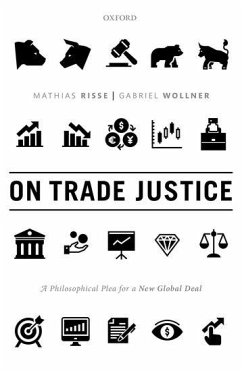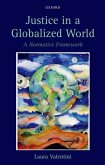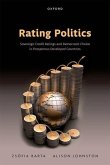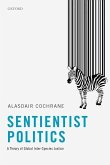Mathias Risse (Lucius N. Littauer Professor of Philosophy and Publi, Gabriel Wollner (Professor of Po Professor of Political Philosophy
On Trade Justice
A Philosophical Plea for a New Global Deal
Mathias Risse (Lucius N. Littauer Professor of Philosophy and Publi, Gabriel Wollner (Professor of Po Professor of Political Philosophy
On Trade Justice
A Philosophical Plea for a New Global Deal
- Gebundenes Buch
- Merkliste
- Auf die Merkliste
- Bewerten Bewerten
- Teilen
- Produkt teilen
- Produkterinnerung
- Produkterinnerung
This book provides a radically new account of trade justice from its theoretical foundations to a range of specific issues. The state as an actor in the domain of global justice is central to the discussion which also explores the obligations of business. It provides a theoretical contribution to the creation of an exploitation-free world.
Andere Kunden interessierten sich auch für
![Justice in a Globalized World Justice in a Globalized World]() Laura Valentini (The Queen's Co Junior Research Fellow in PoliticsJustice in a Globalized World137,99 €
Laura Valentini (The Queen's Co Junior Research Fellow in PoliticsJustice in a Globalized World137,99 €![Rights of Man, Common Sense, and Other Political Writings Rights of Man, Common Sense, and Other Political Writings]() Thomas PaineRights of Man, Common Sense, and Other Political Writings7,99 €
Thomas PaineRights of Man, Common Sense, and Other Political Writings7,99 €![The History of Political Thought The History of Political Thought]() Richard Whatmore (Professor of Modern History and Co- Director of tThe History of Political Thought17,99 €
Richard Whatmore (Professor of Modern History and Co- Director of tThe History of Political Thought17,99 €![Civics Beyond Critics Civics Beyond Critics]() Ian MacMullen (Assistant Assistant Professor of Political ScienceCivics Beyond Critics91,99 €
Ian MacMullen (Assistant Assistant Professor of Political ScienceCivics Beyond Critics91,99 €![The Dispersion of Power The Dispersion of Power]() Samuel Ely Bagg (Assistan Assistant Professor of Political ScienceThe Dispersion of Power132,99 €
Samuel Ely Bagg (Assistan Assistant Professor of Political ScienceThe Dispersion of Power132,99 €![Rating Politics Rating Politics]() Zsofia Barta (Associate Professor, Department of Political Science,Rating Politics103,99 €
Zsofia Barta (Associate Professor, Department of Political Science,Rating Politics103,99 €![Sentientist Politics Sentientist Politics]() Alasdair Cochrane (Senior Lect Senior Lecturer in Political TheorySentientist Politics121,99 €
Alasdair Cochrane (Senior Lect Senior Lecturer in Political TheorySentientist Politics121,99 €-
-
-
This book provides a radically new account of trade justice from its theoretical foundations to a range of specific issues. The state as an actor in the domain of global justice is central to the discussion which also explores the obligations of business. It provides a theoretical contribution to the creation of an exploitation-free world.
Hinweis: Dieser Artikel kann nur an eine deutsche Lieferadresse ausgeliefert werden.
Hinweis: Dieser Artikel kann nur an eine deutsche Lieferadresse ausgeliefert werden.
Produktdetails
- Produktdetails
- Verlag: Oxford University Press
- Seitenzahl: 288
- Erscheinungstermin: 3. Dezember 2019
- Englisch
- Abmessung: 241mm x 156mm x 27mm
- Gewicht: 570g
- ISBN-13: 9780198837411
- ISBN-10: 0198837410
- Artikelnr.: 57063069
- Herstellerkennzeichnung
- Libri GmbH
- Europaallee 1
- 36244 Bad Hersfeld
- gpsr@libri.de
- Verlag: Oxford University Press
- Seitenzahl: 288
- Erscheinungstermin: 3. Dezember 2019
- Englisch
- Abmessung: 241mm x 156mm x 27mm
- Gewicht: 570g
- ISBN-13: 9780198837411
- ISBN-10: 0198837410
- Artikelnr.: 57063069
- Herstellerkennzeichnung
- Libri GmbH
- Europaallee 1
- 36244 Bad Hersfeld
- gpsr@libri.de
Mathias Risse is Lucius N. Littauer Professor of Philosophy and Public Administration and Director of the Carr Center for Human Rights Policy at the John F. Kennedy School of Government, Harvard University. His work primarily addresses questions of global justice - human rights, inequality, taxation, trade and immigration, climate change, obligations to future generations, and the future of technology. He has also worked on questions in ethics, decision theory, and 19th c. German philosophy. He also teaches in Harvard College, the Harvard Extension School, and is affiliated with the Harvard philosophy department. Risse is the author of On Global Justice and Global Political Philosophy. He serves as Co-Director of Graduate Studies at the Edmond J Safra Center for Ethics, as well as Director of the McCloy program. He has been a visiting professor at the National University of Singapore, New York University Abu Dhabi, and Leuphana University. Risse studied in Bielefeld, Pittsburgh, and Jerusalem. Gabriel Wollner is Professor of Political Philosophy at the University of Bayreuth. His academic interests are in political philosophy and ethics, and the application of these inquiries to various issues in public policy and economics. Previous work has appeared in The Journal of Political Philosophy; Politics, Philosophy and Economics; The Journal of Social Philosophy, Review of Social Economy. Wollner studied at the universities of Oxford and Harvard and earned his PhD from University College London in 2011. Prior to joining the University of Bayreuth, he was Assistant Professor in Philosophy at the London School of Economics and Junior Professor in Political Philosophy at Humboldt-Universität zu Berlin.
1: The Political Significance and Philosophical Complexities of Trade
Part 1 - Trade Justice
2: Towards a New Global Deal
3: Images of Trade
4: Trade as One Ground of Justice
5: Exploitation as Unfairness Through Power
6: The Moral Force of Exploitation
Part 2 - Seeing like a State
7: The State as an Agent of Trade Justice
8: A Much-Needed Organization: Rethinking the WTO
9: Domestic Trade Policies in an Interconnected World
10: A Step into the Wrong Direction: Mega-Regionalism
Part 3 - Seeing like a Corporation
11: Theorizing the Firm
12: Dealing with Workers: The Question of Wages
13: Dealing with Communities: The Relocation of Jobs
14: Dispersed Responsibility: Cooperating with Other Firms and Authoritarian States
15: Conclusion: What Can Be Done?
Part 1 - Trade Justice
2: Towards a New Global Deal
3: Images of Trade
4: Trade as One Ground of Justice
5: Exploitation as Unfairness Through Power
6: The Moral Force of Exploitation
Part 2 - Seeing like a State
7: The State as an Agent of Trade Justice
8: A Much-Needed Organization: Rethinking the WTO
9: Domestic Trade Policies in an Interconnected World
10: A Step into the Wrong Direction: Mega-Regionalism
Part 3 - Seeing like a Corporation
11: Theorizing the Firm
12: Dealing with Workers: The Question of Wages
13: Dealing with Communities: The Relocation of Jobs
14: Dispersed Responsibility: Cooperating with Other Firms and Authoritarian States
15: Conclusion: What Can Be Done?
1: The Political Significance and Philosophical Complexities of Trade
Part 1 - Trade Justice
2: Towards a New Global Deal
3: Images of Trade
4: Trade as One Ground of Justice
5: Exploitation as Unfairness Through Power
6: The Moral Force of Exploitation
Part 2 - Seeing like a State
7: The State as an Agent of Trade Justice
8: A Much-Needed Organization: Rethinking the WTO
9: Domestic Trade Policies in an Interconnected World
10: A Step into the Wrong Direction: Mega-Regionalism
Part 3 - Seeing like a Corporation
11: Theorizing the Firm
12: Dealing with Workers: The Question of Wages
13: Dealing with Communities: The Relocation of Jobs
14: Dispersed Responsibility: Cooperating with Other Firms and Authoritarian States
15: Conclusion: What Can Be Done?
Part 1 - Trade Justice
2: Towards a New Global Deal
3: Images of Trade
4: Trade as One Ground of Justice
5: Exploitation as Unfairness Through Power
6: The Moral Force of Exploitation
Part 2 - Seeing like a State
7: The State as an Agent of Trade Justice
8: A Much-Needed Organization: Rethinking the WTO
9: Domestic Trade Policies in an Interconnected World
10: A Step into the Wrong Direction: Mega-Regionalism
Part 3 - Seeing like a Corporation
11: Theorizing the Firm
12: Dealing with Workers: The Question of Wages
13: Dealing with Communities: The Relocation of Jobs
14: Dispersed Responsibility: Cooperating with Other Firms and Authoritarian States
15: Conclusion: What Can Be Done?








